| Note: BlackCommentator.com Editorial Board member Chuck Turner is writing this
column from the U.S. Federal Prison in Hazelton, West Virginia
where he is serving a three year term for a bribery conviction.
On the afternoon of December 16, 2008, a
group of supporters and I were sitting in my office at City
Hall, flush with the excitement of having organized a spirited
rally at City Hall. Steve Kirshbaum, an organizer and leader
in the International Action Center (IAC), had asked IAC's
President Ramsey Clark, former Attorney General under President
Lyndon Johnson, to come to Boston to give support. We thought
Ramsey's appearance in Boston would increase the visibility
and strengthen our campaign to counter the media stories,
designed to convict me in the court of public opinion.
We all were feeling the high that comes from
seeing your plans work well. There had been morning stories
in both daily papers and a strong turnout at the afternoon
rally. The media was there in full strength so we expected
to have strong evening coverage. Even if there was negative
spin, they couldn't hide the fact that Ramsey had come to
Boston to support me. Personally, having a world renowned
human rights fighter come to Boston, praise my work, and
assert his faith in my innocence was a needed emotional
uplift. While I thought we were waging a good fight and
the media was a little less cutting than at the time of
my arrest, the wear and tear of hearing and reading negative
descriptions of me as an alleged criminal were emotionally
draining, to say the least.
Terri and the family were strong in their
support, but I knew that they were feeling the emotional
pressure as much if not more than I. In fact, seeing the
effect of the stress on my wife Terri, my family, and friends
was the most difficult part of being targeted. I felt it
was more difficult for them to hear me described so negatively
than it was for me. I was used to it. Even though they had
heard negative discussion of me during my years on the Council,
this barrage was more intense and continuous. So having
Ramsey standing beside me, praising my work, and committing
himself to be part of our fight was emotionally gratifying
and would give everybody a needed uplift, particularly Terri
and the family.
As the conversation turned to what challenges
the next few weeks would bring, my friend and investigator
for Barry Wilson, lead lawyer in my legal team, Kazi Toure
foreshadowed a cloud that was to engulf all of us for the
next eleven months when he said Sullivan's assistant, John
McNeil had called to say that he wanted me to sign a "protective
order". "What's that", I asked and Kazi explained
that it was an order that would require that once we received
the discovery (their evidence against me), we couldn't talk
publicly about anything in it.
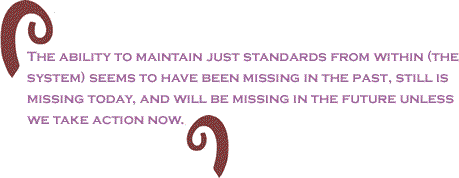
My immediate response was "Why would
I sign that. It's a gag order. They see the campaign in
the court of public opinion is working and they want to
shut it down." The thoughts were coming faster than
I could get them out. What about the pictures on the day
of my arrest? What about the release of the conversation
between Feeney and the Senator designed to remove the cloud
of suspicion hanging over her based on her involvement in
getting the license for Wilburn? If I signed the order,
why should I have any faith that they wouldn't continue
to leak evidence whenever they wanted? Everybody agreed
that it didn't make sense so Kazi said he would call Barry
who was on vacation to let him know I wouldn't sign it.
A few days later, Kazi and I sat down to
talk about life, organizing, and the struggle. During the
conversation that ranged far and wide, Kazi said that he
had talked to Barry who said that he understood my sentiments
and concerns. At the same time, he said that I needed to
recognize that since protective orders were used in many
cases, particularly high profile cases, it might be difficult
to avoid signing. Also, conversations with the Senator's
lawyer indicated that she had already signed it in order
to expedite receipt of the discovery.
I knew that I was not making the situation
easy for Barry and his need for the evidence but still I
felt that I couldn't consent to signing a gag order. I knew
that the only evidence they had were the pictures and three
recordings that had been referenced in the affidavit issued
on the day of my arrest. So there were no surprises that
we should worry about discovering.�
 Also,
I had to talk about the case and my innocence during the
upcoming campaign for my Council seat. I was afraid that
Sullivan would try to tie what I said into their "evidence"
and I would wind up sitting in jail waiting for the trial
and trying to figure out how to pay for the forfeited $50,000
bond. In addition, given what my ancestors had endured with
the hope of freedom for future generations, what would they
say at the thought that I had given up my First Amendment
rights for fear of going to jail.� Also,
I had to talk about the case and my innocence during the
upcoming campaign for my Council seat. I was afraid that
Sullivan would try to tie what I said into their "evidence"
and I would wind up sitting in jail waiting for the trial
and trying to figure out how to pay for the forfeited $50,000
bond. In addition, given what my ancestors had endured with
the hope of freedom for future generations, what would they
say at the thought that I had given up my First Amendment
rights for fear of going to jail.�
Terri supported my campaign in the court
of public opinion but was very concerned every time I talked
with the media. Her fear was that Sullivan would find a
way to use what I said against me. Fortunately, she agreed
that signing the protective order would be a major mistake.
Without her support, the emotional strain around this issue
would have been unbearable given my lawyers' tension at
the thought that they would not receive the discovery until
21 days before the trial. With Terri's support, I stood
firm in my opposition to signing. We would wait for Sullivan's
next move.�
On January 5, 2009, Sullivan's and McNeil's�
next move became clear when they filed a motion with Judge
Magistrate Hillman requesting that he require that I sign
the "gag" order in order to receive any of the
evidence that they had gathered. Even some of the reporters
and columnists who had been attacking me began to question
how Sullivan could be requesting such a requirement given
the pictures that he had released on the day of my arrest.�
Our legal response was to challenge the motion and ask that
Judge Magistrate Hillman not approve it. However, two months
later he signed the motion, creating a court order saying
that I had to sign the protective order or my lawyers would
have to wait until 21 days before the trial to receive any
of the discovery.
A few days later Kazi said that McNeil couldn't
believe it, when Barry told him that I was not going to
sign the order and that we would wait to receive the discovery.�
Both my lawyers, Barry Wilson and John Pavlos, were very
concerned about their ability to provide the type of defense
needed if put under that constraint but honored their commitment
to follow my lead in terms of handling the trial from a
political perspective.
At that point, I thought that the issue was
resolved and that there was nothing to do but wait for the
trial date to be set so we would know when we would receive
the evidence. Again, my thinking was that the government's
evidence was so weak that while the wait was a tremendous
constraint, my legal team could still mount a winning defense.
While they were not necessarily as convinced as I, they
continued to accept my position. From time to time Kazi
would remind me of what I was giving up in terms of their
ability to win the case.� While I certainly did not want
to lose and go to jail, I reminded Kazi that my belief was
that life's purpose is to test our ability to live by principle.
I felt I had no choice but to refuse to sign.
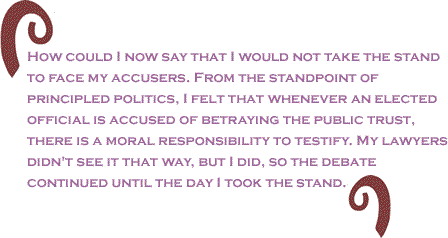
Much to my surprise, Sullivan and McNeil
had one last move to try to force me to sign the order.
Approximately, a month after I refused to sign, Kazi called
to say that a new motion had been filed. In this motion
they requested that Judge Magistrate Hillman require that
I take the evidence without having to sign the order. Had
the First Amendment been repealed, I asked myself. How can
Sullivan and McNeil ask a judge to require that I give up
my right to speak freely? Even though my lawyers had indicated
that I was willing to wait until three weeks before the
trial to get the evidence, they now were going to force
me to take it despite my opposition. This was another one
of those moments when the only thing I could think to say
was "They have no shame".
My legal team thought that I had no alternative
once the motion was approved. I would have to accept the
evidence or be in contempt of court. I had a different view.
Since a date had not been set for trial, from my perspective,
we were still in the court of public opinion phase of the
process. To me, the key question was whether a judge in
this phase would find a City Councilor in contempt of court
for refusing to give up his First Amendment rights. My answer
was no he wouldn't. So when Judge Magistrate Hillman approved
the order, I told my team to let McNeil know that I had
instructed them to send the evidence back unopened if McNeil
sent it and to file a motion to have Hillman's position
on the motion reconsidered by the judge who would preside
at the trial, Judge Woodlock.
 Judge
Magistrate Hillman didn't find me in contempt and Judge
Woodlock agreed to have a hearing regarding reconsideration
of the motion. At the hearing, he said that he found it
reasonable that a protective order be issued in order to
assure that the trial was tried in his court not in the
media. In addition, he said that though Judge Magistrate
Hillman's order said that my legal team could receive the
evidence 21 days before the trial, he thought that if given
the evidence that soon I might release information before
the trial and "taint" the process, "poison
the well." Judge
Magistrate Hillman didn't find me in contempt and Judge
Woodlock agreed to have a hearing regarding reconsideration
of the motion. At the hearing, he said that he found it
reasonable that a protective order be issued in order to
assure that the trial was tried in his court not in the
media. In addition, he said that though Judge Magistrate
Hillman's order said that my legal team could receive the
evidence 21 days before the trial, he thought that if given
the evidence that soon I might release information before
the trial and "taint" the process, "poison
the well."
When Barry began to question the overriding
of an order given by another judge, Judge Woodlock said,
"....You asked for a reconsideration. It's sometimes
the case that one should be careful about what one asks
for". He went on to say that he hadn't made a final
decision but was leaning toward what he called "the
old standards" where the defendant received the evidence
after the prosecution had conducted a direct examination
of a witness.
Barry continuing to argue the appropriateness
of the 21 days said, "Now if we go back to the old
rules, the old rules are also going to mean that we're going
to have to stop and break because even in the old rules
you've got some time--".
Judge Woodlock shot back, "They sometimes
do, they sometimes don't. but we'll see how things work
out, if it comes to that; but this is a circumstance in
which your client hold the keys to the shackles that he
describes."
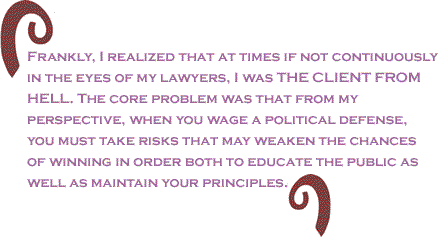
While Judge Woodlock kept saying that he
had not made a final decision, it was clear to me that he
was prepared to make the situation as difficult as it needed
to be in order to force me to sign the protective order.
Obviously, if we couldn't get the information until after
the prosecution examined each witness and have little to
no time to examine it, a defense would be impossible and
Judge Woodlock would say that it was my decision that had
created the difficulty not his.��
Then, as if to balance the situation, he
said he shared my concern about the level of publicity given
my arrest as well as whether it was necessary to arrest
me rather than issue a complaint and have me appear in court.
He asked all the parties involved in the decisions to give
affidavits explaining their reasoning both in terms of the
arrest as well as the release of the pictures. However,
after he received them, he chose not to make public the
affidavits by the key officials and said nothing more about
the government's actions.
After the hearing, I felt that Judge Woodlock
had put me in a box. I could continue to refuse the discovery.
However, while he said at the hearing that he had not made
a final decision, it seemed likely we would not receive
it 21 days before the trial to use to prepare a defense.
In all probability, we would receive the portions relevant
to the witnesses the government put on the stand after each
witness had been examined by the prosecution, making defense
virtually impossible.�
Therefore, I relented and informed Barry
that after the election I would accept the discovery under
the terms offered. My reasoning was that once I won the
election, my only objections to signing the order would
be the principle of not compromising my First Amendment
rights and the possibility that the US Attorney's office
would use the situation to release again� some of the discovery.
However, I felt that the publicity around the issue and
the involvement of the presiding judge provided protection.
Yes, I was compromising my First Amendment rights, but I
thought my ancestors would understand given my fight to
resist signing the order.
The day after my 20% margin of victory in
the November Council election, I released a statement to
the press saying that I viewed my election victory as a
victory in the court of public opinion and that it was now
time for me to concentrate on a victory in federal court.
To strengthen the likelihood of that victory, I had ordered
my lawyers to accept the evidence in order to prepare a
defense for the trial that was due to begin in March, 2010.
Thus approximately a year after my arrest, my lawyers began
to receive the evidence the prosecution would use to try
to convict me of a crime I didn't commit.
B) Analysis:
1) Waging a Political Defense:
Let me be clear before I begin this piece.
I am not a lawyer. I have not worked with lawyers extensively
or been involved in numerous legal cases. As an activist,
I have been supportive of some who have been on trial but
usually as an outsider not as an active participant in the
defense. I begin with this disclaimer so that you will understand
that what I am saying is from the perspective of a legal
novice. That said let me begin.
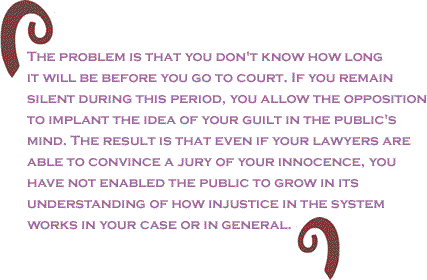
When the police came to arrest me at my City
Hall office, I laughed. Clearly, they were serious and I
was about to begin the hardest and most serious fight of
my life. Yet, the idea that at age 68, I was being arrested
for a crime I didn't commit was so ridiculous the only reasonable
reaction was to laugh.
I didn't even know what my crime was but
I did know that the motivation to charge me with a crime
had to be political. When Terri called to tell me the police
had been to our house and were on their way to arrest me,
I said "Well its finally happened". Terri and
I both laughed because she had said for years that my political
work would either get me killed or arrested. Better to be
arrested than killed I thought and laughed again.�
What I didn't realize as I went through the
pressures of my first day as an accused felon was that the
hardest part of the next two years would be the effort to
wage a political defense. By political defense, I mean a
defense that is constantly and continuously calling the
public's attention to the injustice that is being perpetrated.
When you are accused of a crime that you didn't commit because
of the political objectives of your accusers, you have two
alternatives. You can leave your defense up to your lawyers.
Allow them to go through the discovery and develop a strategy
to persuade the jury of your innocence.
The other alternative is to attempt to educate
the public inside and outside of court before and during
the trial. It a dangerous strategy because as my lawyers
constantly warned me, the opposition will listen to what
you say to understand the type of arguments that your lawyers
will make in court so that they can be fully prepared to
counteract your defense when the trial finally takes place.
The problem is that you don't know how long it will be before
you go to court. If you remain silent during this period,
you allow the opposition to implant the idea of your guilt
in the public's mind. The result is that even if your lawyers
are able to convince a jury of your innocence, you have
not enabled the public to grow in its understanding of how
injustice in the system works in your case or in general.
I was fortunate that I had two lawyers, Barry
Wilson and John Pavlos, who understood the politics of power
as well as the injustice that undergirds the legal system
in which they practice. They understood how the system was
weighted against their clients. They appreciated that if
the defense allow the prosecutors to be in control they
are in fact colluding with the injustices that are being
perpetrated. Yet, they are lawyers and looking for the balance
between the politics of the situation and the legal framework.
As I related in chapter four, there was a
continuous debate that went on with my lawyers and I regarding
the balance. They appreciated my perspective; they supported
my politics; yet they were the ones who not only had to
handle the day to day details of working within the legal
structure to prepare for trial but also to develop a defense
that could bring victory. Just as the prosecutors are focused
on winning, every defense lawyer is intent on winning. That
is their job. That is their responsibility. If they are
not committed to winning, they should not be defense lawyers.
Therefore, they want to have a client who will accept their
views on how to win.
Frankly, I realized that at times if not
continuously in the eyes of my lawyers, I was THE CLIENT
FROM HELL. The core problem was that from my perspective,
when you wage a political defense, you must take risks that
may weaken the chances of winning in order both to educate
the public as well as maintain your principles. Probably,
the clearest example of this tension between my lawyers
and myself was the issue of the protective order.
Protective orders are a relatively standard
part of the legal process, particularly in high profile
cases. They are viewed by judges as the tool to prevent
the cases from being tried in the media as opposed to the
courts. If you don't sign them, the judges have the power
to keep all the evidence from your lawyers until just before
the beginning of the trial or even later.. Without the evidence,
obviously the construction of a defense is virtually impossible.
Therefore, while my lawyers understood why I was unwilling
to sign the order given my political campaign, given the
unscrupulous nature of the US Attorney and his assistant,
and given my belief in my freedom of speech, they still
felt that I was making it much more difficult for them to
do their job which is to build a winning defense based on
the evidence.�
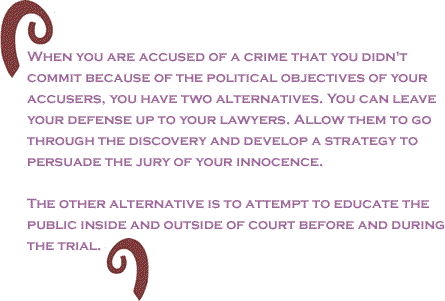
Nonetheless, they were willing to live with
the restriction that they wait until 21 days before the
trial to receive the evidence. They were not pleased with
that situation, but they appreciated my politics and therefore
were willing to continue as my lawyers in a situation where
other lawyers might have walked away. However, Judge Woodlock
increased the level of difficulty 100%.� At a hearing in
July 2009, eight months after my arrest he indicated that
he was leaning toward using the old standard rather than
the 21 days recommended by the judge magistrate.
The old standard was one where the defense
did not receive the evidence regarding a particular witness
until after the prosecution had finished their direct examination
of the witness. Obviously, Judge Woodlock was trying to
force me to sign the protective order by creating a situation
where if I didn't sign the order, my lawyers would have
no chance to examine the evidence before the trial began.
Thus I submitted to the reality that the only way to avoid
losing the trial and avoiding jail was to sign the order.
However, I exercised my legal prerogative and waited until
I had won the election.�
The day after the election, I announced that
I would sign the order. A few weeks later, over a year after
my arrest, my lawyers were able to examine the evidence
and realized that I was telling the truth when I said there
was no evidence against me beyond what was in the FBI's
original affidavit. However, there was volumes of information
that Sullivan and McNeil hadn't wanted me to talk about
like the fact that the innocent businessman who the Senator
and I were extorting had been hired by Sullivan almost a
year and a half before my arrest and had been paid almost
$30,000 to entrap us.
Unfortunately, however, the debate over the
elements of my political defense had to continue. As my
lawyers examined the evidence, they reached the conclusion
that the prosecution did not have enough evidence to build
a credible case. From their perspective, there was no reason
for me to take the stand with all the dangers that arise
when the defendant testifies. From my perspective, I had
to testify.
At age 59, I had run for office not only
to use the office to organize but also to raise the standards
of political representation at the City level. Given that
objective, how could I now say that I would not take the
stand to face my accusers. From the standpoint of principled
politics, I felt that whenever an elected official is accused
of betraying the public trust, there is a moral responsibility
to testify. My lawyers didn't see it that way, but I did,
so the debate continued until the day I took the stand.
2) Double Standard:
The idea of requiring the defense to sign
a protective order is reasonable if the objective is to
keep both sides from leaking information so that the discussion
of the evidence stays within the framework of the court.
Its even more reasonable in high profile cases where there
is an intense focus by the media. Unfortunately, particularly
in high profile cases, there seem to be no ethical standards
for the prosecutors' behavior regarding distribution of
evidence that are enforced. It seems that invariably in
high profile cases, there is a release of evidence by the
prosecutors in the early stages. To then put a restriction
on the defense when their rights have already been abused
is to exercise a double standard that becomes part of the
process of prosecutorial terrorism.
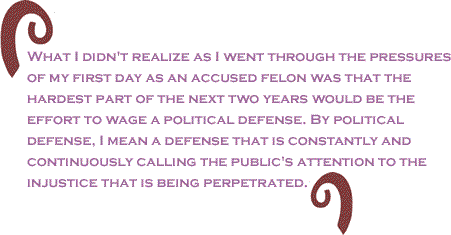
An examination of my case reveals the way
this double standard operates. "Photographic evidence
of my alleged guilt" was released less than an hour
and a half after my arrest. This is a strategic move in
a case involving a politician where one of the objectives
is to destroy the credibility of the target before there
is the opportunity for a defense. Given the vulnerability
of politicians, such an early attack can be devastating
regardless of the outcome of the case.
While there were a number of hearings in
the spring of 2009 with Judge Magistrate Hillman regarding
the protective order, he did not ever deal with the issues
my legal team raised regarding the improper use of the evidence
by the prosecution. At the July 2, 2009 reconsideration
hearing, Judge Woodlock acknowledged the inappropriateness
of the early release of the evidence as well as questioned
whether there was a need for an arrest. He then ordered
that affidavits be written by all parties in the U.S. Attorney's
office and the Boston Police Department who were parties
to the decision making.
Unfortunately, that was the last we heard
of the issue. The affidavits by low level officials who
were not key to the decision making process were made public.
The rest were sealed which meant that neither was there
a public disclosure of the reasoning of high level officials
nor was there any statements from Judge Woodlock regarding
misconduct by the prosecutors.�
The reality is that the US Attorneys and
their assistants work closely with the judge magistrates
and the district judges on a daily basis for years. It is
a psychological reality that when you have close on going
relationships in work situations, the ability to criticize
your colleagues becomes more and more difficult given the
perception of the potential effect on those relationships.
Mark Wolf, Chief Justice, of the Massachusetts
federal bench is admired by many for his willingness to
stand up and challenge the prosecutors in a way that other
judges do not. The question that the public has to examine
is how we can eliminate this double standard in terms of
the public disclosure of evidence before the trials begin
if we do not put controls on the prosecutors' behavior.
The ability to maintain just standards from within seems
to have been missing in the past, still is missing today,
and will be missing in the future unless we take action
now.
Before leaving the issue of protective orders,
my case raises the question of who does the protective order
protect. In my case, Sullivan and McNeil's frenzy over getting
me to sign the protective order before receiving the discovery
grew out of their knowledge that once we had the evidence,
we would discover that it showed that the Senator and I
couldn't have been involved in a conspiracy to extort money
from Wilburn because Wilburn, as McNeil admitted on the
first day of my trial, had been hired a year before I was
arrested to entrap the Senator and me.
The discovery we waited a year to receive
also showed that on June 5, 2007, less than two months before
Wilburn gave me enough money to "take your wife out
to dinner", he tried, based on orders by his FBI handler
to get the Senator to agree to involve me in the entrapment
web he was weaving around her but she refused. In addition,
the discovery showed that before I volunteered to file a
hearing order regarding discrimination in the distribution
of liquor licenses on June 22, 2007 in response to the Senator's
email on June 19, 2007 to the Council, Wilburn had given
the Senator $1500: $500 on June 5, 2007 and another $1000
on June 18th.
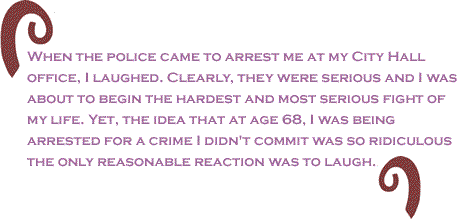
At a hearing at the Moakley Court House on
June 3, 2010 in front of Judge Woodlock where the Senator
changed her plea to guilty, Asst. US Attorney McNeil offered
the Court as background for the reason that Wilburn gave
the Senator the $1000 on June 18th the following testimony:
"With respect for Count 3, on or about
June 17, 2007, Wilkerson spoke with the cooperating witness
on the telephone about her continuing efforts to obtain
Dejavu a non-transferable license. She told the cooperating
witness that she 'talked to the Mayor' that morning and
had also spoken with the Mayor the night before about the
license for Dejavu. She told the cooperating witness that
she had been informed that the Mayor's assistant could help
in obtaining the license to sell beer and wine until a full
liquor license freed up. The cooperating witness expressed
his appreciation for Wilkerson's efforts and told her 'I
want to give you something' I want to see you Monday (June
18th)."
So before the Senator sent her email to the
Council asking for help which led to my hearing order, she
had secured the Mayor's cooperation in getting the license
and had received $1500. Obviously, if we had received the
discovery without the protective order, we would have exposed
Sullivan's whole rotten scheme to make it look like I had
something to do with an operation to get Wilburn a liquor
license that was fully underway with the cooperation of
the Mayor according to Wilkerson before she even reached
out to the Council.
When she did reach out, she didn't reach
out to me as she had been asked by Wilburn on June 5th.
She reached out instead by email to the Council as a whole
because she wasn't speaking to me at the time because of
my opposition to her advocacy for a Northeastern dormitory
at the corner of Ruggles and Columbus.

Why didn't my legal team bring these issues
out at the trial to expose the government plot to frame
me, you ask? While the conspiracy charge was kept in place
for almost two years, it was dropped just before the trial
without explanation by Asst US Attorney John McNeil. However,
at the Senator's Plea hearing on June 3, 2010 four months
before my trial, while dropping the conspiracy charge against
the Senator, McNeil asked the judge to keep it in place
in my case.
Excerpt from June 3, 2010 Plea Hearing for
Senator Wilkerson:
The Court: And with respect to the Conspiracy,
the Government's declining to move forward on the Conspiracy
with respect only to Ms. Wilkerson?
Mr. McNeil: Only with respect to Ms. Wilkerson.
The Court: Not with respect to the other
alleged coconspirators?
Mr. McNeil: That's right.
The Court: All right.
Why, you ask, didn't he drop the conspiracy
charge against me on June 3rd? I believe because he wanted
to maintain the fiction, the illusion of the conspiracy
in the mind of the public up to the last possible moment
in order not to expose the lie he and Sullivan had been
perpetrating for two years. That's why Sullivan and McNeil
had to have a protective order. The purpose was not to protect
anyone against my actions. The purpose was to protect the
Lie they were perpetrating regarding the conspiracy and
my guilt. However, he had to drop it before the trial, otherwise
my legal team would have exposed their deceptions to the
jury.
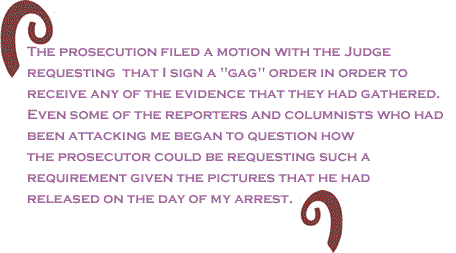
The question that obviously has to be asked
is if there was this kind of deception and misconduct around
the purpose of the protective order in my case, how often
does this kind of deception and misconduct go on in other
cases across the country? Let me repeat, if we don't enact
laws that allow prosecutors to be prosecuted as well as
sued for their misconduct, this kind of injustice will go
on and other men and women will be convicted and sit in
jail just like me, innocent of the crimes for which they
have been framed by prosecutors "gone wild".
C) Action Steps:
We have stated in previous chapters the need
for legislation limiting the release of information by prosecutors
before trial. We have also suggested that there need to
be financial penalties to those releasing as well as those
publishing evidence. We need these tools to prevent the
prosecutorial terrorism that is practiced in US courts every
day. However, while we are waiting for Congress to take
the necessary action, we need to have the Justice Department
establish watch dogs, inspector generals so to speak, who
would have the power to sanction those prosecutors who abuse
their power. Without mechanisms to check abuses of power,
they are guaranteed to continue. Power corrupts and absolute
power corrupts absolutely.
As a means of generating more political pressure
for action to assure prosecutorial fairness, there needs
to be research committees as I have mentioned in previous
chapters. These research committees need to be part of a
national structure with units in each state. In the area
of protective orders, we need to be assessing how these
orders are used and documenting whether they are being used
fairly or fraudulently to perpetuate the double standard
discussed in my case. We need to have the ability to identify
whether the prosecutors are leaking evidence that will poison
the well of public opinion against the defendant while preventing
the defense attorneys through the use of protective orders
from balancing the discussion.
We need justice within the practices of the
criminal justice system. It is clear that justice is missing.
It is clear that those in charge of the system are benefiting
from the injustices. The number of Americans being put in
prisons at all levels has quintupled over the last 36 years
rising from less than 500,000 of all races in 1975 at the
beginning of the War on Drugs to 2.3 million today with
over 1 million black men and women incarcerated. We now
have a higher percentage of our population in jail than
any other country in the world as well as a higher percentage
of minorities in jail . The numbers continue to grow despite
the drop in crime rates and the correction officers union
is alleged to be the fastest growing union in the country.
The question I believe is whether the people
of this country will continue to believe the propaganda
promoted by prosecutors and their allies that the problem
is not in the operation of the criminal justice system and
its prosecutorial system but in the lack of character of
those arrested. It is time for us to decide whether we intend
to have our children's children grow up in a fascist state
parading as a democracy with the government imprisoning
an increasing number of its citizens while targeting for
prosecution those who call and fight for justice. Where
do you stand? What are you willing to do? If not now, when?�

Next Chapter: Three Ring Circus
A
Luta Continua - The Struggle Continues,
Chuck
Click here to
read any part in this BC series.
BlackCommentator.com Editorial Board Member Chuck
Turner - Served as a member of the Boston City Council
for ten years and eleven months. He was a member and founder
of the Fund the Dream campaign and was the Chair of the
Council�s Human Rights Committee, and Vice Chair of the
Hunger and Homelessness Committee. Click here to
contact Mr. Turner. Your email messages will be passed on
to Mr. Turner by BC. You may also visit SupportChuckTurner.com.
You
may also write to Mr. Turner. The address is:
Charles
Turner #80641038
Hazelwood Penitentiary, P.O. Box 2000
Bruceton Mills, West Virginia 26525
|

